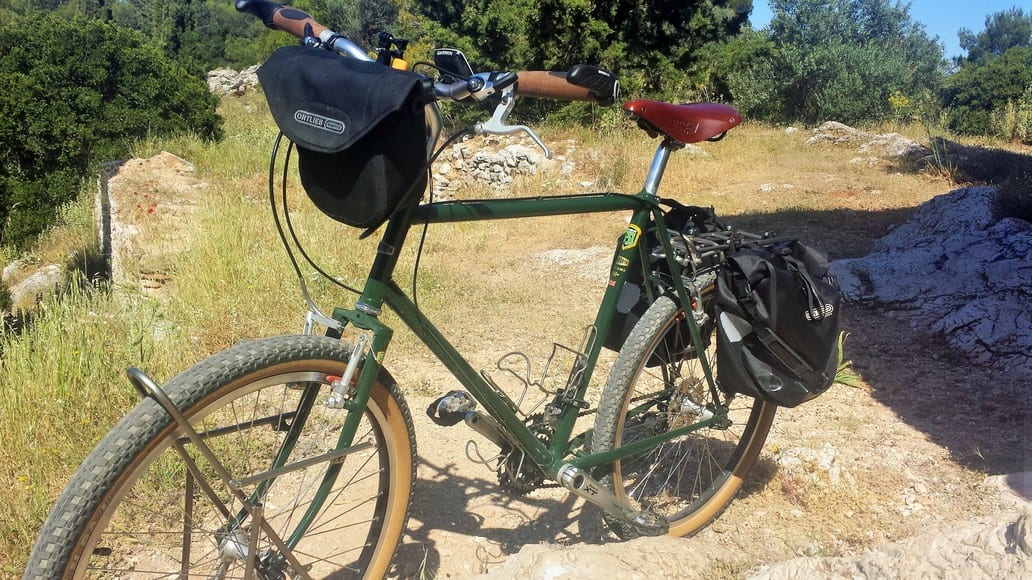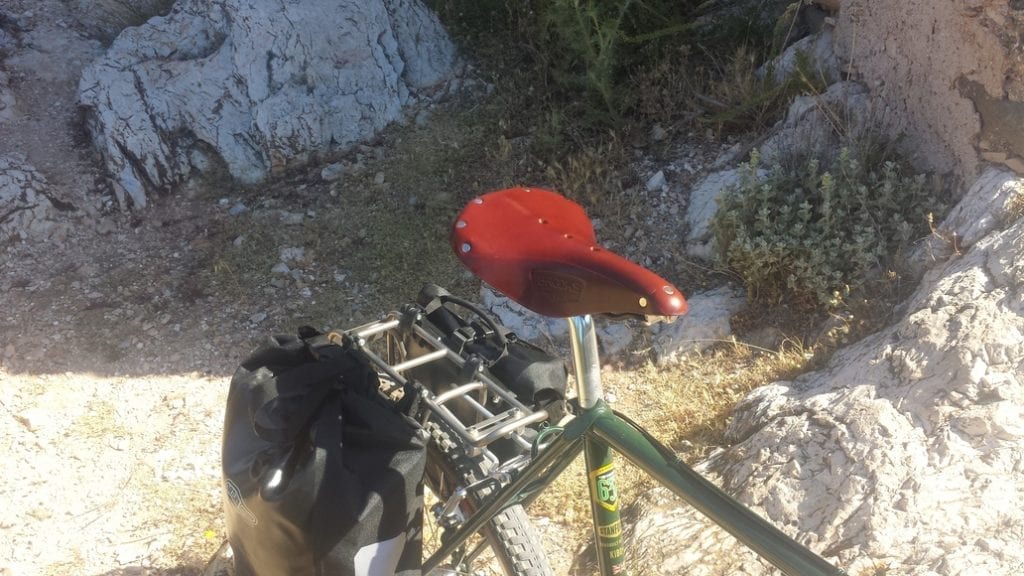The Stanforth Kibo+ Expedition Bicycle is a bike designed to travel the world. Having been kindly loaned one for my cycling trip from Greece to England, I thought I would take a little time to let you know my thoughts on it. Here we go…

Stanforth Kibo+ Expedition Bicycle
“Would you like to try out the new Kibo+ on your next cycling trip?”, I was asked.
“Sure,” I replied. “Can you post it to Athens?”.
Sometimes, I have to pinch myself to see if I am dreaming. Over the past few years, I have been offered a number of incredible opportunities for which I am truly grateful. To review a bike designed for adventure touring is something special though.
It's not just being able to use the bike, it's the thought that my opinions are valued by an extremely talented bike builder. So, thank you very much Simon of Stanforth Bikes!

What is an expedition bicycle?
In my mind, an expedition bicycle, is a bike that is useful on both sealed roads and dirt tracks. It should be a tough, no-nonsense machine, which once purchased, you shouldn't have to worry about.
Reliable is the keyword. Having undertaken several long-distance bicycle tours over the years, there are three things I look for in a general purpose expedition bicycle to travel the world. These are:
- A Steel Frame (no suspension forks)
- 26 Inch Wheels
- V-Brakes

Stanforth Kibo+
The Stanforth Kibo+ Expedition Bicycle ticks all of those boxes. The frame is 631 steel, and the V-Brakes are Paul's, which have incredible stopping power.
A couple of years back, I had reviewed the previous incarnation of the Kibo, which you can read about here – An Expedition Bicycle With Style. This model had cantilever brakes, and my opinion at the time, was that V-Brakes would be more suitable.

Other notable features on the Kibo+ include Deore XT components, and a Brooks saddle. Basically, every component and detail has been well thought out, resulting in a great looking bike which will happily take you around the world over many years.
Note – If you are reading this and planning to travel the world by bicycle, you may wonder why I am against suspension and disc brakes, and pro-26 inch wheels. Put simply –
- Suspension will go wrong, and mostly likely in the middle of nowhere. It weighs more. Avoid.
- Disc brakes will go wrong, and are a pain to fix, especially when in the middle of nowhere.
- You can't get inner tubes and tyres for 700c wheels in many places around the world. 26 inch inner tubes and tyres can be found everywhere.
- Note – Middle of nowhere isn't just a day's ride from the nearest bike shop. It's a country where luxury items such as quality bicycle parts are non-existent.

So, the Stanforth Kibo+ Expedition Bicycle has this covered. This has been designed as a bike to travel the world on, and as such, has an elegant simplicity which I whole-heartedly appreciate.
Expedition Bike Review
I could go into great detail about the specs, but it is probably better if you just check them out here – Kibo Specs. An important thing to keep in mind, is that the Kibo+ is hand-built in the UK, meaning that you can talk to Stanforth, and request parts be swapped in and out.
This is just a short review, because I intend to write more about it after I have cycled from Greece to England. I have included a video review below as well though, so you can get a better idea of what it looks like.
Planning a cycling trip around the world? The Stanforth Kibo+ Expedition Bicycle could be just what you are looking for!
More Bike Touring Posts
You might also be interested in these bicycle touring blog posts:
- Bicycle touring tips
- Best Bike Touring Tires
- Bike touring gear reviews
- Electronic Gear To Take On A Bicycle Tour: Cameras, GPS, and Gadgets
- Best Saddles For Touring: Most Comfortable Bike Seats For Cycling
- Best Powerbank for Bike Touring – Anker Powercore 26800
 Article Author: Dave Briggs
Article Author: Dave Briggs
Dave has cycled around much of the world, including multi-year bike touring trips such as cycling from Alaska to Argentina, and England to South Africa. Check out his reviews and tips about bike touring.
Follow Dave on social media for travel, adventure and bicycle touring inspiration:
I would appreciate bike a bit more with a longer head tube. My current 520 disc is pretty similar, and a lot cheaper. I have to say, unless its Tasmania, I think most areas cary 700 tubes. But yep, better in rural or truly 3td world areas to go 26”. On a downhill with heavy loads mechanical disc brakes are life savers.
Yep, it’s a nice solid bike. Easily suitable for this Greece to England cycle trip, which I think will be mainly over paved roads.
Thanks very much Vicki!
I love the simplicity of the design of this bike (plus green is an awesome colour). I would love to do a long trip by bicycle….it would just be very slowly! hahaha. Oh, and a Brooks saddle is a must!
Im sure you dont wish it to be downhill with tailwinds all the way…wheres the challenge in that. Nop you need a good few soul searching hills to get up…a few crazy bends…etc. Looks a smart bike…though feel bit sorry the lovely yellow bea bike hasnt got out on any long trips.
Have a good trip.
Hx
Well, some downhill and tailwinds are fine 😀
Poor Bea has only done the short ride through the Fens – Cycling the Fens
I’m sure there are plenty miles left in front of her though 🙂
While you are partly right I think much of this reasoning are largely myths these days.
You are cycling from Greece to the UK, that is not exactly middle of nowhere.
Mechanical disc brakes are easy to fix, though can be a pain in the a*se for other reasons. Rim brakes wear the rims out and thereby weaken the structural integrity of a safety relevant feature. Of course that doesn’t happen over night and rim breaks, if components are chosen wisely and cared about will last ages. I cycled 15000+ km across Central Asia and Highway 219 across Tibet on 1 set of brake pads and they were only worn 30-40% by then.
26″ parts are easy to source around the world, true, but not always what “quality bike parts” and while e.g. the skill in bike mechanics to build a wheel is widespread, the skill to build a strong wheel isn’t easy to be found. And what good is a bike part, when it doesn’t live up to the job?
With that train of thought one had to go singlespeed. Or ride local brands. In China the flying pigeons, in Africa the Indian brands. These are bikes that can be repaired by any village blacksmith.
If you still need to travel to the capital in order to source parts, your chances are that there is an upmarket shop selling 29er, 650B+ or 700cc parts.
It is also a myth that only steel can be easily repaired. Same applies to aluminum. In general, the question is not whether a steel frame can be welded easily but how durable the repair is. In a nutshell, the welder has to know the material and make sure that it doesn’t get too hot otherwise the frame will break right next to the weld seam.
Last not least: things might happen, they don’t have to. Bikes can get stolen or run over by truck (happened to a swiss guy …)
Still: it’s a nice ride! 😉
Hi Simon – Nice to hear from a fellow cyclist. You raise some interesting points, so I thought I would take the time to answer them here!
I totally agree that cycling from Greece to the UK is not exactly middle of nowhere. In fact, in many ways, I expect this to be one of the easiest bicycle tours I have done since cycling around New Zealand nearly 15 years ago! The review however is for an expedition bicycle, regardless of what trip it is taken on.
Having toured with both disc and v brakes, I would only ever tour now with V brakes, as it reduces the hassle factor. It’s each to their own on this one, just thought you should know I have tried both, so my opinion comes from personal experience on this front. There is a danger of cheap rims wearing out. My train of thought here, is that few parts of a bike are eternal (dérailleur, rims), and should be replaced after a few years of heavy use in any case.
In terms of 26 inch wheels – My experience here is again hard earned! When I cycled through Africa, I was unable to find 700c inner tubes or tyres from Sudan all the way to Tanzania. At that point, I had some shipped out to me at great cost. Never again! I still remember how it felt to pass by 26 inch inner tubes and tyres, no matter how shitty they were, and regret not having 26 wheels! As for wheel building – This is a skill most long term bicycle touring cyclists pick up after a while I think.
In regards to steel frames on touring bicycles – This is my preferred choice. It actually isn’t as much to do with the idea of them being ‘repaired’, as it is to having seen a couple of touring cyclists with aluminium frames having them ‘dinged’ or dented. The impact (according to these cyclists) would not have damaged a steel frame. On both occasions these cyclists said they would buy steel in the future. Although of course I felt sorry for them, I far prefer to learn from other peoples mistakes than my own, so I will stick to steel!
As for things happening – You are damn right they do! I remember having gone to great lengths to have a rear wheel specially built for my Alaska to Argentina bicycle tour, and a tree fell on it in a storm! – Falling Tree
Safe travels my friend!